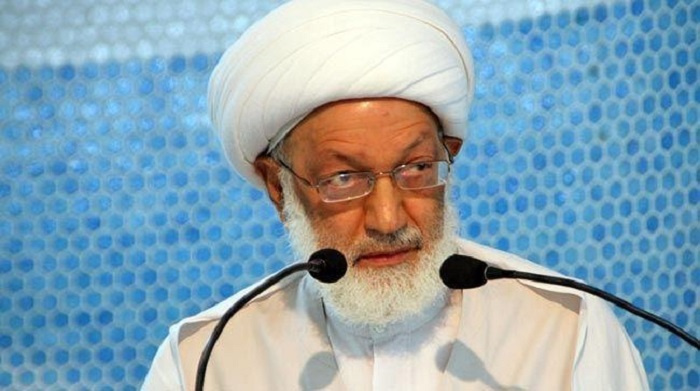Bahrain Desperately After Tension. How About Iran?

Bahrain stripped the spiritual leader of the kingdom’s Shia Muslim majority of his citizenship, which has resulted not only in protests outside his home but also furious backlashes from Iran.
A week after a Bahraini court banned the country’s main opposition group, al-Wefaq, accusing it of fomenting sectarian unrest and having links to a foreign power – a clear reference to Iran, the move against Ayatollah Isa Qassim, known by many to represent Iran’s Supreme Leader in the archipelago. Bahrain’s BNA state news agency, citing an interior ministry statement, said the cleric had been trying to divide Bahraini society, encourage young people to violate the constitution and promote a sectarian environment.
Iran has been a fierce critic of Bahrain’s Sunni monarchy and tensions between the sides have escalated in recent years as Al-Khalifa started to suppress Shiite protestors since early 2011. A final blow came when the under-the-pin country cut diplomatic ties with Iran, following a similar decision by the Saudi kingdom.
Iranian authorities are taking turns responding to the move. The most viral response came from Brigadier General Soleimani, the high-profile commander of the IRGC’s elite Quds force, who issued a very harsh statement, slamming Manama for crossing a red line that will set fire to Bahrain and the entire region. PressTV quoted him as saying it would “leave the people [of Bahrain] with no other choice but armed resistance.”
“Definitely, Al Khalifah will pay the price for this and it will result in nothing other than the collapse of this bloodthirsty regime,” the IRGC commander said.
Soleimani warned that supporters of Bahrain's Al Khalifah regime must know that disrespect to Sheikh Qassim and the continuation of excessive crackdown on Bahraini people will “trigger a bloody intifada,” whose consequences would be on those who legitimize the outrageous behavior of Bahrain's rulers.
The IRGC commander further noted that the Al Khalifah regime is committing more crimes on a daily basis and represses the people of Bahrain while the United Nations, the US and Western countries maintain their “meaningful silence”.
In a separate statement, the IRGC itself warned the Al-Khalifa regime will have the same fate as other dictatorial states ousted when they failed to surrender to the righteous demands of their people.
In reaction, Bahrain said Isa Qassim is part of the Iran project and linked with the IRGC.
In a statement on Monday, Iran’s Ministry of Foreign Affairs also condemned the Bahraini regime’s intensification of its security approach toward religious and national leaders, opposition to religious beliefs and principles, and misappropriation of religious assets and funds of the Bahraini people.
It added that such measures would dash any hope of reformation in Bahrain through dialogue and peaceful means. The ministry urged the Al Khalifah regime to end the ongoing crisis in the country by stopping its illegal behavior, avoiding “the destruction of all the bridges for communication with the people and moderate leaders of the country, accepting the realities of the country, and holding serious national dialogue.”
Manama’s move has taken many by surprise. The US State Department said it was “alarmed” by Bahrain’s action. “We are unaware of any credible evidence to support this action,” said John Kirby, a spokesman for the department. Bahrain is a U.S. Gulf ally and hosts the U.S. Navy's Fifth Fleet. Hezbollah and the UN have also warned that the revocation of Isa Qassim’s citizenship could foment sectarian conflicts in the country. Human Rights Watch has also joined in scorning Bahrain. Other Iranian civil and military authorities, including Major General Hassan Firouzabadi, Chief of Staff of the Iranian Armed Forces, have expressed contempt.
The whole episode has coincided, separated only by two days, with an MFA reshuffling that replaced the ministry’s ex-deputy for Arab and African affairs, Hossein Amir-Abdollahian with Hossein Jaberi Ansari. The former was known as a ‘revolutionary diplomat’ with close ties with the IRGC and General Qassim Soleimani while the latter is said to be more open to negotiation in regional matters, particularly in Syria. Now comes Rouhani advisor Hessamoddin Ashna’s tweet which has implications already in the air: “The first serious challenge for the new MFA deputy. Two statements; one revocation of citizenship and the second a revocation of legitimacy. Welcome to the exhausted heart of Prudence [Administration], Mr. Deputy.”
Jaberi Ansari has so far declined to comment about the episode but he is very unlikely to take an official stance as harsh as that of military leaders, since he knows too well Iran’s role in the region is to control crisis, not to foment conflict. Now that most regional and global voices are on Iran’s side, it would be a mistake to turn the tides, in the interest of the few warmongering Arab states.

